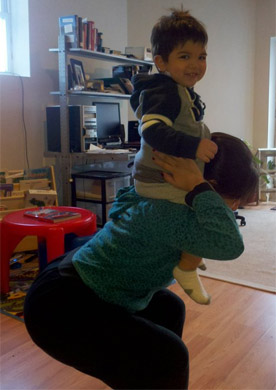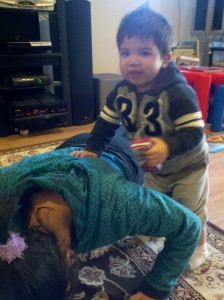by Michelle Sutton-Kerchner
With weight loss the journey should be your goal, not the destination. Focus on a healthier life, and a healthier weight often follows …
Frequently, we define fitness by body weight. The emphasis of a workout is on weight loss or athletic goals. What’s the inspiration for the average-sized human to ever break a sweat? How about the individual who has lost 20 pounds so far instead of the 35-pound goal? For success, create goals throughout your wellness path, and don’t necessarily focus them on your weight.
When member Kimberly Castro reflects on her weight loss story, she notes she was somewhat tricked into her skinny jeans. Rather, her big accomplishment was a life-enhancing experience.
Kimberly was gifted a membership to the Center by her sister in exchange for some babysitting time for Kimberly’s nephew, Aydin. They needed her help so Kimberly agreed to the deal, not realizing she needed the help as well.
Reprioritizing
“On my first day at the Center, my goal was to lose weight. However, that changed when I met the on-site nurse and a personal trainer,” explains Kimberly. She learned to shift her focus from weight loss to resistance and endurance training. “I realized the more I work on these goals—and a generally healthier lifestyle—the easier it would be to stay on track with my overall fitness journey. The weight loss would happen along the way.” Kimberly discovered a weight loss gem: Just like a watched pot never seems to boil, so go the numbers on a bathroom scale.
According to the National Weight Control Registry (NWCR), a group that studies thousands who lose weight and keep it off, there isn’t one perfect diet or exercise program. By avoiding a rigid scheme to lose weight quickly, you allow yourself to experiment. You learn what works to improve your body and mind. Usually, these discoveries indirectly lead to obtaining your ideal weight.
“My transformation was gradual but amazing,” shares Kimberly who emphasizes there is no pill, easy meal plan, or gimmick to lose weight. “Success originates from the commitment you make to a healthier lifestyle.” Try new activities and ways of eating. Through trial-and-error, you learn what suits your taste—both on the dinner plate and Exercise Floor.

When Kimberly recognized fitness as a process, not a destination, she then enjoyed a “life-changing experience.” She claims the 30-pound weight loss became rather insignificant. “Losing weight is not my big accomplishment. Becoming healthier, stronger, and staying young inside surpassed any numbers on the scale,” she notes.
The NWCR studies emphasized there is no end to healthy habits. Make healthier choices slowly and thoughtfully. This new lifestyle is for the long-term. Include a fitness plan that evolves with you. Shoot too high and you’ll fall short, discouraged. Aim too low and you won’t see results, discouraged again.
If cycling isn’t your initial preference, don’t expect to grow into an avid cyclist after six weeks. Hate asparagus? Don’t include it in your new meal plan, regardless of its benefits. If you don’t like something, and it doesn’t help you feel alive and energized, you won’t commit.
Kimberly took advantage of the Center’s complimentary personal training session and nurse evaluations. “I worked closely with a personal trainer to change my routine every eight weeks. If you really focus on training, you need to review your workout right about then to keep seeing results. The best part—the sessions are included in your membership!”
Kimberly also checks in with the Center nurse every three months. Although initially you may not see the change, big improvements are going on behind the scenes when you exercise. “Things like body fat percentages don’t lie. Seeing those numbers improve motivated me. They represented how well I was doing,” Kimberly says.
A Warning for Frequent Scale Visitors
Successful weight loss does require self-monitoring. However, that doesn’t mean twice daily scale-checks. Often, the numbers become an obsession. Some dieters report almost having a phobia about getting on the scale, facing it with the nerves of someone hyped up from too much sugar, caffeine, or both. (Hey, those factors really might be the cause of the anxiety!)
Scales can be misleading. As you’re well aware, they measure everything—fat, muscles, bones, organs (perhaps your heart is simply swollen with pride at that moment, right?), and even a recently consumed cup of tea. Forget it if it’s winter and you happen to weigh yourself in clothes or boots.
Body weight can’t measure health. On any given day, your weight can fluctuate by several pounds. Water, food intake, and muscle development can have a significant impact.
- With the body consisting of approximately 60 percent water, hydration levels can easily change the numbers on the scale. Dehydration actually can reflect a higher weight because it triggers your body to retain water.
- Prior to the digestion process, any food you’ve eaten will add to your weight.
- Muscle is more dense than fat. As you slim down and tone up, you could actually weigh more. (Even if not the case, the old “It’s all muscle weight” excuse always feels good to say out loud.)
A bathroom scale cannot give a true measurement of our health, including our mass body fat. One slight shift in the wrong direction on the scale may cause all attempts at health to be abandoned. Skip a scale trip. In its place, take a minute to image you are where you want to be. Positive affirmation is probably more motivating.
Do Keep Track
As Kimberly discovered, following up with the Center nurse to track and improve progress is motivating and effective. Don’t abandon your bathroom scale completely. Use it weekly or even monthly in addition to other monitoring methods, including body fat measurements. A personal trainer can help track body fat and keep numbers on file with your nurse evaluation.

Try to get measured under the same circumstances every time, including a time of day when hydration, food intake, and body temperature are the same. For example, if you were measured in the morning, consistently follow up with additional measurements at that time of day. Use the same personal trainer, if possible. Everyone has a slightly different technique. Again, only measure weekly or monthly. Otherwise, you may miss the small but significant changes you are creating.

Former couch potato Kimberly now has a triathlon in her personal history. Even more impressive on some days, she has the energy to babysit her nephew—the tot who started all this. “My dream jeans actually became my ‘very fat jeans.’ The fat just melted off because my focus wasn’t on my weight or jean size,” emphasizes Kimberly. She reached her shooting-for-the-stars-goal and became a healthier person, yeah, in a smaller size.
Sources
“How Often Do You Jump on the Scale?” weight loss forum at www.about.com.
“Four Ways to Track Your Weight Loss Progress,” by Paige Waehner at www.about.com.
“Secrets to Successful Weight Loss,” by Paige Waehner at www.about.com.
 Fitness & Wellness News Your Source for Fitness News, Wellness News, Health News, and Nutrition News!
Fitness & Wellness News Your Source for Fitness News, Wellness News, Health News, and Nutrition News!



